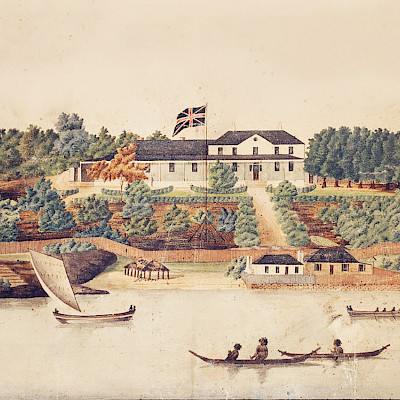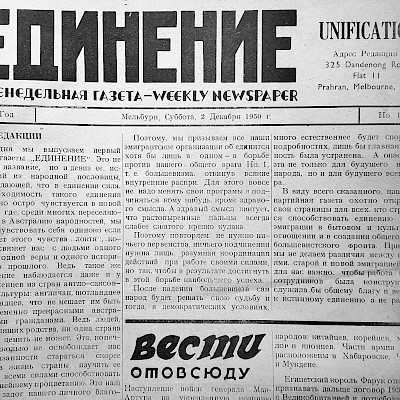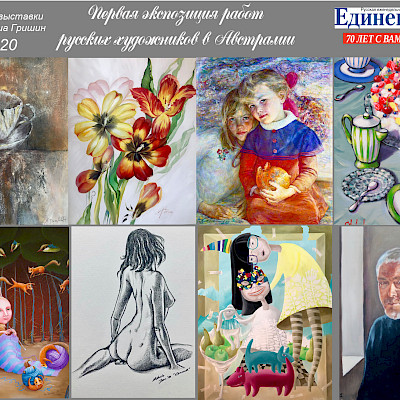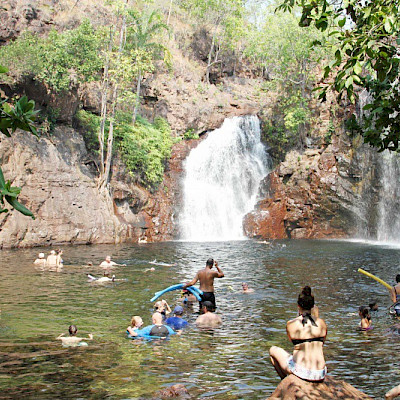“While some foreigners might first envision Putin, the hammer and sickle, or even an AK-47 when prompted to think about Russia, the Russian people believe that the outside world only perceives their country as a land of “bears, circuses, and balalaikas”… the current status of the balalaika proves how much of a versatile and adaptable instrument it is. Unmistakably, the balalaika’s musical potential is incredibly expansive for an instrument that only possesses three strings. Throughout history it has been able to express rebelliousness, joy, suffering and love.” The ‘Adaptability’ of the Balalaika: An Ethnomusicological Investigation of the Russian Traditional Folk Instrument. Nicolas Chlebak, University of Vermont
Lunin Show Productions (LSPro), an Australian company with Russian background is behind the Australian tour of the Russian balalaika player.
Slava Lunin, founder and CEO of Lunin Show Productions, explained the choice of performer (Slava Lunin himself is a well known all over the world as a former circus performer, his famous Perezvony Trapeze Act was recognised and applauded by many famous and influential people, including Michael Jackson, Princess Stefania of Monaco, French actors Alain Delon and Jean Paul Belmondo), «It was not hard to make the choice. My Moscow friends advised me to watch Alexey’s performance. I’m always interested in watching something unusual because something usual is more common. But God gave me lots of chances to meet gifted and talented people. I was so impressed by Alexey’s performance, I thought it was really good, it’s our Russian culture. I promised myself to bring him to Australia to show his art and Russian soul. My dream is coming true this April (I hope). Australian viewers will have a unique chance to meet Alexey and our Russian balalaika».
Lunin Show Productions has organized an interview with Russia’s balalaika virtuoso, the result is here for our readers attention.
— Alexey, your art of balalaika performance, despite the distance, is very well know (at least by Australian Russian speakers) thanks to YouTube. Please, tell us what to expect at your concerts in April?
— I will bring everything I have created during my solo career. It will be interesting by its distinctiveness. It will be live music, and the difference between live music, personal meeting and YouTube is significant.
— It will be your first time in Australia. What impressions do you have about the continent?
— Very common impressions, from Hollywood movies: Australian nature, Aboriginal history, didgeridoo. Didgeridoo is quite famous in Russia.
— Are you interested in the didgeridoo from the musical point of view?
— I believe, all musical instruments are interesting. Everything depends on «who’s playing». It doesn’t matter how sophisticated your tool is. And thank God nobody can learn absolutely everything about any kind of musical instruments. When everything will be learned there will be no place for creativity.
— Do you think you will have any problems bringing your musical instrument from Moscow to Australia because of the distance?
— I will carry it with maximum level of care. It will be with me in a cabin just above the seat. But I have other important parts to bring over to Australia — the electronic parts. The electronic sound track is very important for me. We will bring the best possible quality out of everything similar to what currently exists in the world.
— Will the big temperature rise (between Russia and Australia) affect somehow your instrument in any way?
— Of course, it will affect instrument. But the biggest problem is the humidity. One of my violins was damaged near Madagascar because of the humidity. It got swollen and created a hole as a result. I will have to think more about how to deal with Australian humidity.
It’s a pity to do any swaps of instruments. An instrument is similar to a spouse. It’s a rare event when I use two instruments during performances. By the way I have one and only one wife, she is also my sound producer which is extremely convenient for the family.
Currently I’m playing on [a not on?] violin made in 1915 (created by Nalimov, balalaika maker). I bought it from a German collector who had it for 50 years.
— You often mention during your interviews that the older a musical instrument, the better it is for performance.
— Different physical changes happen with old timber, which makes it more acoustically interesting. But old instruments are not just a brand, it is also about the unique people who have created them. You can always recognize the sound of the creator in each instrument he has ever made.
Obviously, somehow non-living objects become living subjects in the level of creation.
Then… everything is up to the musician. The main thing for me during performance is something I call «transparency», it is not about how to show the balalaika or myself, but the feeling. When there is no balalaika, no musician, even sounds are lost in music.
— After leaving State Academic Folk Ensemble «Rossiya» directed [conducted?] by Lyudmila Zykina in the early 2000s, you started your solo career. Do you still feel skeptical towards collaborating with other musicians?
— I have some «collaboration» experience from time to time, but I am really in love with the story when balalaika is on its own. I like to disappear in its sounds, collaborating with… my instrument. Collaboration with the instrument is where you can see more and more worlds within your instrument.
— Some musical experts believe that you are jazz performer.
— I’m not a jazz performer or an ethnic performer, some strange genre was created: I play my own stuff, my own thoughts, in post-modern styles. It’s connected to different composers and styles, like a journey through different musical stories. I believe that my musical creations are stories, novels
— Every now and then you receive compliments in the form of comparisons, such as to Paganini and Hendrix. According to your previous interviews (with the Russian media) you are not very fond of those comparisons.
— Comparisons with Paganini and Hendrix are just a template. I have done, perhaps, something like what they had done to violin (Paganini) and guitar (Hendrix): something which no one previously thought of doing. I gave balalaika an opportunity to play in big music halls, but I haven’t changed the instrument itself. Balalaika is a self-sufficient, ancient instrument. It hasn’t lost its beauty. Electronics, which I use to enchant its sound, is similar to a magnifying glass. In the case of balalaika, electronic stuff is an exit from the folk museum. History is important but I had an intention to see how the balalaika could cope in the modern world. Balalaika itself represents the place, the territory where it was born, a Russian genotype. But the world changes and I wondered how people, who are used to so many different things, perceive the balalaika.
— Does it mean that you feel sorry for ethnic balalaika music?
— As any other boy in Soviet Union who didn’t get a chance to play popular musical instruments (piano or guitar) I feel sorry for myself. Ethnic instruments were in the background — they were not «trendy». I just wanted to try to help this «orphan» (balalaika).
— It sounds like a Cinderella story! One of your most popular songs for the balalaika has the same name!
— I would say so. The instrument is very plain, but its sound sometimes pinches your soul in a very special way. The balalaika has the ability to survive on the big stage for sure.
— Let’s talk about Jimi Hendrix again. You are often invited to different types of guitar festivals overseas where you are the single balalaika player, aren’t you? Do you think guitar players consider you one of them?
— They would never consider me as one of them as I don’t have enough strings on my instrument (laughs). But they are definitely interested. I think they feel ashamed that, sometimes, they achieved less satisfactory results by using six guitars than when I used one balalaika.
So many different guitar festivals are happening, the biggest one is an annual festival in Corsica.
— Can you play guitar? Can guitar players play balalaika?
— A musician can play any musical instrument if it makes sense for him.
— Do you have any apprentices, students or followers?
— I don’t have time and I’m not willing to teach. It is a great responsibility, someone would need to go through a lot to do so. Also, I don’t believe in followers. It’s very difficult to teach one to love; you can teach playing, but it’s not enough. It’s hard to learn that type of thing unless you are gifted.
— Is balalaika music about love?
— Yes, balalaika is about love, it’s very private, intimate, so much more than just to have fun. My priorities changed when I grew older. You don’t need to be the best, you don’t need to be number one. I’m searching for different targets now. It’s more about soul. The result of my performance is to see that people are touched, it’s very important. The instruments cannot play by themselves, but they can help someone to discover their meanings.
— What meanings, at world scale, are important for you?
— I live in this world and this world has something to do with me. People are not very different, irrespective of continents and politics. People are so alike, with their controversies and flaws: promoting war while lacking love [?]. It reflects how they live. Humans are not developed enough in order to be peaceful creatures. They project that defect around them, which hurts other people, nature and the Earth. One of the tasks of art is to change humans, stop them on their way of chasing the illusion. Money is good but money cannot solve problems arising from the absence of love and happiness.
— How do you project this task of art during your overseas tours?
— One of my intentions during overseas tours is to change the angle of rejection. The world is not just politics. We are going to visit America in May, it seems Americans are interested (in the balalaika). We are going in Delhi in March and another visit to India in July, it will be at a temple opening ceremony.
— Do you have any wishes to those who will watch your performances in Australia? You will perform once at each of the Gold Coast, Sydney, Melbourne and Canberra. How should we prepare not to miss something important? Should we drink vodka?
— No, you don’t need vodka (laughs). Audience members are expecting a meeting with someone or something. I’m very curious to meet people from the other side of the Earth. I’m really keen to watch the reaction of authentic Australian people, someone who doesn’t know what balalaika is. The audience response could be very different — not necessarily cheers for performer. Sometimes you don’t want them to applause, silence is more valuable.
It would be good if people come to the performance. Meeting is something unexpected, something you cannot define, but it is a kind of attention.
The most important thing is to have space within your soul.
«Though there exist many more influential reasons explaining the rocky relationship between Russia and the USA (and other western countries to add, A.P.) , one could be the latter’s lack of understanding of many nuances in Russian culture, including, perhaps, its musical culture… whether in proverbs, music, history, painting or any number of other Russian cultural elements, the balalaika remains a singular feature of popular recognition…
the case of the balalaika is exacerbated by the fact that it is an instrument found almost exclusively within Russia,…the balalaika certainly had its own place during this time of transition.
…After possibly a thousand years of existence, the balalaika has proved its adaptability to any situation. Surely its future will not be an exception.»
The ‘Adaptability’ of the Balalaika: An Ethnomusicological Investigation of the Russian Traditional Folk Instrument
Nicolas Chlebak
University of Vermont
Your chance to meet Alexey Arkhipovsky:
The Star Gold Coast on 17 April,
Llewellyn Hall in Canberra on 18 April, Melbourne Recital Centre on 21 April
City Recital Hall in Sydney on 23 April
















